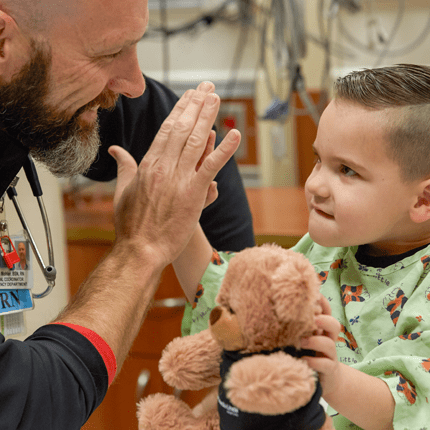

Neonatal Services and Innovations

Advanced Technology and Specialty Care
The Children’s Hospital of Michigan is a national leader in the use of Extracorporeal Membrane Oxygenation (ECMO) – a technology that functions as a temporary replacement for an infant’s heart and lungs after hypoxic-respiratory failure or after cardiac surgery. The Children’s Hospital of Michigan’s NICU is one of 3 neonatal units in Michigan with ECMO capabilities.
With a high-resolution MicroPET scanner located at the Children’s Hospital of Michigan, the NICU team provides this advanced PET technology for scanning newborns. Neonatologists also perform up to date monitoring of the brain for injury using amplitude integrated EEG, near infra-red spectroscopy and evaluation of markers of brain injury.
Pediatric cardiologists, cardiac surgeons and transplant surgeons repair congenital heart defects, treat and repair heart disease, and perform heart transplants. The NICU, with the assistance of pediatric hematology-oncology specialists and nephrologists, provides chemotherapy, stem cell transplant and dialysis to young infants with neonatal tumors, immune disorders and end-stage renal disease. Pediatric general and subspecialty surgeons perform repairs on congenital birth defects and other neonatal conditions requiring intervention.
Groundbreaking Research
Several active research studies are underway through the neonatal and perinatal team at the Children’s Hospital of Michigan and Hutzel Women’s Hospital. In addition, the Children’s Hospital of Michigan is part of the National Institutes of Health funded NICHD Neonatal Research, an elite group of several pediatric research hospitals nationwide. This network is part of the National Institute of Child Health and Human Development (NICHD).
Seetha Shankaran, M.D., has led groundbreaking research on the use of therapeutic whole body cooling for infants who don’t receive enough oxygen or blood flow to the brain at birth. The study found that use of a cooling blanket to reduce a newborn’s temperature to 92.8 degrees effectively reduces brain injury after a birth where the infant suffered birth asphyxia. This treatment is now the standard of care in the NICUs of many academic centers.
The initial study was published in 2005. Now, Dr. Shankaran, Dr Athina Pappas and the Neonatal Research Network are reviewing the outcomes of the infants who were enrolled in the study 6 or 7 years ago. The follow-up study is reviewing cognitive and health long-term outcomes. Dr. Shankaran will be the lead investigator in an upcoming NICHD study evaluating longer and deeper body cooling to try and reduce disability still further among asphyxiated infants at birth
The neonatal research team also is researching for respiratory failure in term or near-term infants. The NICHD Neonatal Research centers will be examining inhaled PGE1 for the treatment of pulmonary hypertension in the newborn, led by Dr. Beena Sood. Other active research performed includes impact of environmental toxins during pregnancy on the infant and child (Ostrea, Cepeda), Optimizing nutrition for infants (Koo), impact of substance use outcomes in the adolescent (Delaney Black), markers of brain injury (Chouthai), follow up of high risk infants (Pappas and Lua), markers of lung injury (Kazzi, Natarajan and DeJesus), outcome following cardiac transplants (Bajaj) and measuring pulmonary function in neonates (Chawla).
High-risk infants also receive extensive follow-up care at the Children’s Hospital of Michigan Developmental Clinic, where neonatologists and psychologists follow patients through age 5, obtain outcomes data for research, identify growth & developmental delays and coordinate care.

Neonatal Neurocritical Care - NeuroNICU
The brain grows at the highest rate in the initial three months of life. This period also has a high risk for brain injury and great potential for brain recovery and rescue. With increasing survival of all NICU patients there is a greater need for focus on improving neurodevelopment among the highest risk survivors.
Recognizing the need to manage and minimize neurological complications associated with preterm and term newborn babies, Children’s Hospital of Michigan has developed the Neonatal Neurocritical Care Program. The NeuroNICU offers a 6 bed unit housed within the Neonatal Intensive Care Unit (NICU) of the hospital. The program is the only one of its kind in Metro Detroit and one of a select few in the nation, providing a specially trained team of clinicians, dedicated to providing a developmentally appropriate environment to optimize neurologic care and developmental outcomes for this highly vulnerable population.Maternal Fetal Medicine
The DMC’s Maternal Fetal Diagnosis Program unites the Children’s Hospital of Michigan and Hutzel Women’s Hospital for exemplary care, including:
- Infertility services
- Prenatal genetic testing
- Fetal echocardiography
- Fetal surgery
- High-risk obstetrical services
- Pediatric subspecialties
- Referrals to community programs to assist families of infants with special needs
- Maternal Special Care Unit, Michigan’s only ICU for expectant mothers
- Neonatal Intensive Care Unit (NICU)
- Pediatric surgery


